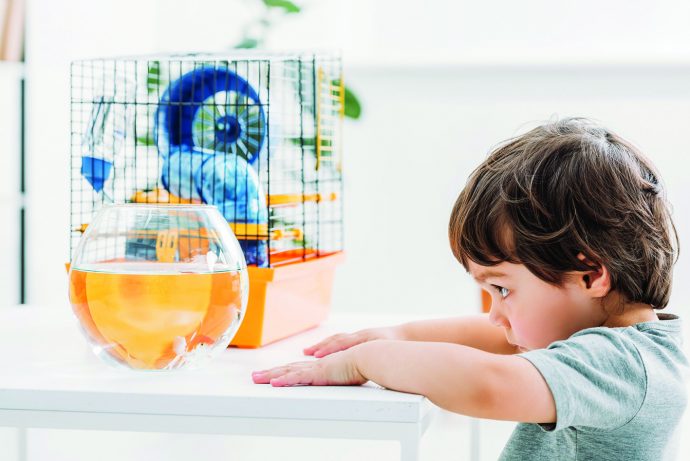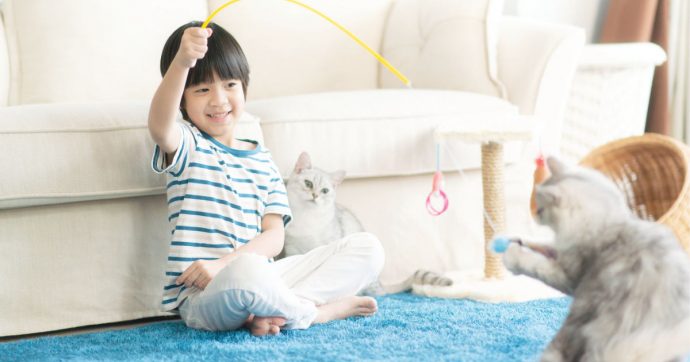Having a pet at home can have numerous benefits for the family, including children. Caring for and playing with pets can have a positive influence on kids and contributes to their well-being.
Pet benefits
The benefits of having a pet cover a wide range of factors such as mutual unconditional love and acceptance (between the child and pet), and most importantly, it helps kids develop a sense of care, love, support, acknowledgement and connection. Having a pet can also provide kids with a positive way to manage stress and learn about responsibility.
Letting your child care for a pet can help him develop self-esteem, self-confidence, compassion and empathy. Your child’s pet can also become a confidant and help him understand some of life’s more complicated lessons related to reproduction, birth, illnesses, accidents and death. Most of all, having a pet can teach your child to become more independent, proactive and responsible.
The experience of having a pet and caring for it involves a deep process of engagement between your child and the pet in question. Learning how to care and nurture another living being is a huge responsibility, which allows for development of executive functioning (e.g., problem-solving, decision-making, planning, organising, critical thinking, etc.). Your child is likely to learn how to:
- Plan and organise activities related to pet-care (e.g. training, feeding, grooming, etc.)
- Respond to a crisis (e.g. pet becomes ill, problem with the pet’s habitat, etc.)

Developing skills for adult life
Caring for a pet encourages your child to develop skills in problem solving, creativity, critical thinking, reaching out for help and being resourceful. These skills contribute to better resilience and the ability to adapt to life’s challenges, helping him to be more independent. Let’s inspire our children towards personal competency and guide them to thrive on their self-efficacy!
Getting the right pet
When it’s time to get your child a pet, you need to sit down with him and talk about what type of pet is suitable for him based on factors such as where you live, who you live with or whether anyone has allergies.
As a general guide, these are some points to consider when getting a pet:
Home & lifestyle:
Firstly, the size of your home limits the size of your pet, and this is especially true for dog-lovers (the larger the breed, the more space the dogs will need). If you happen to live in a small apartment or share a house with other people, this would also further limit your pet of choice.
Time & commitment:
Your family’s lifestyle determines how much time you and your child have to spend on pets. In general, smaller-sized pets need less attention, so you can use this as a general guide to decide on the type of pet.
Level of responsibility:
If the pet will be under your child’s care, you will need to assess his level of responsibility, his capability in caring for the pet, and even the complexity of care that may be required. Ensure that the added responsibility should not clash with existing ones such as schooling. If you fail to take these factors into account, the pet’s care would fall back to you as the parent.
Start simple:
The level of care varies from pet to pet so if it’s your child’s first time caring for one, it’s better to opt for an animal that’s beginner-friendly, e.g. fish (guppies, betta fish, or goldfish), hamsters, guinea pigs, or some species of cats/dogs. Avoid exotic pets or wild animals as they can be difficult to care for and may bite/scratch their owners. Certain wild animals are also illegal to keep as pets in Malaysia, such as pangolins or the Indian star tortoise. Make sure you do your research before heading to the pet store. Just because it’s sold at the store, doesn’t make it right!
Ideally, the final choice should be a pet that you have experience with. This will allow you to share your own experience in caring for it with your child and thus provide him with proper guidance. As a bonus, this is also a chance to spend some quality time together.
You are your own backup
Lastly, you should also be prepared for the worst case scenario! If your child fails at fulfilling his end of the deal by not caring for the pet properly or neglecting it completely, you will need to either sit down with him to talk things through, or take over the responsibility yourself.
The responsibility of owning a pet is one that will span many years. With dogs and cats, that could mean over a decade. Make sure your family understands this commitment before deciding on getting an additional member of the family!
An educational contribution by Malaysian Paediatric Association.







Comments